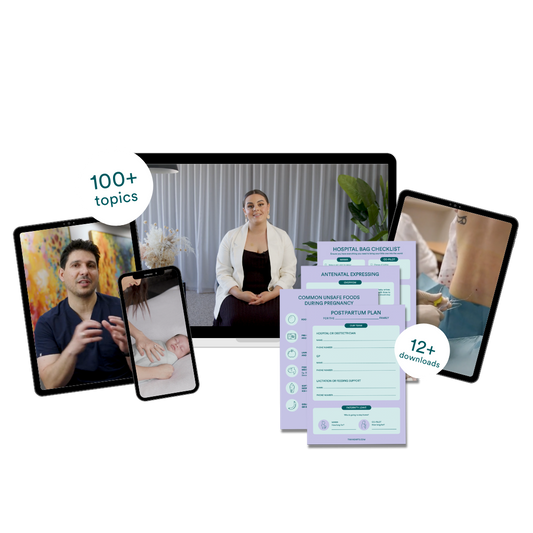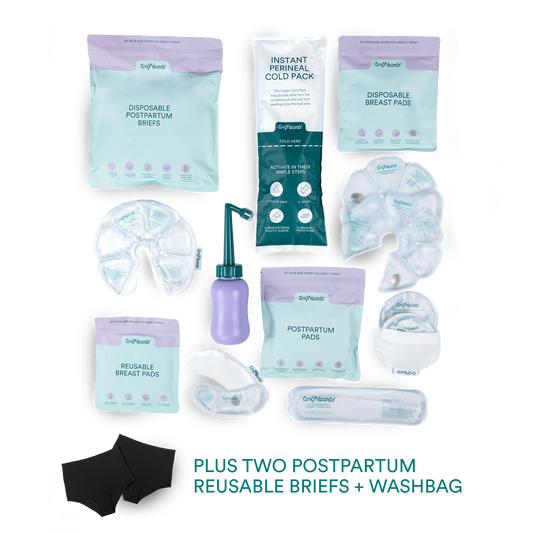Okay parents, this is the stuff we don't often talk about - but there's truly no reason we shouldn't! Our organs "down there" are every bit as normal and important as our other body parts, hence it's high time we dropped the taboo talk and valued them for what they are.
Yes, I'm talking vulvas and penises!
As well as knowing what's normal and what's not when your little love is a baby it's SO valuable to be able to have open and shameless conversations about these body parts later on...
As our kiddies grow we want them to learn that genitals are a natural and normal part of being human, am I right!? So it's helpful to know that teaching our children this from the get-go has the power to prevent our little people from feeling embarrassment, shame or poor body image around their more private parts as they get older.
Every time we change a nappy we see these body parts I'm talking about but from now on I want you to take a little more notice of what you see. Here's what you need to know so you can respond if something changes.
For little girls
Vulva - that word we really don't use enough!
This is the external reproductive organ of females, consisting of the labial folds/lips and the entrance to the vagina. There are a few things that can happen with and around the vulva in little girls so we've broken them down below.
Swollen Labia Did you know it's actually quite common for a bubba girl's labia to be swollen at birth. This occurs for two reasons: Newborns are often carrying extra fluid at birth, and bubs often receive an extra dose of their own hormone estrogen just before they enter the world. Both the hormones and the fluid will be flushed out in your little girl's urine in the first few days after birth, but swelling may remain for several weeks. Rest assured it's harmless and will resolve on its own.
Vaginal Bleeding It's also common for girls to have a mini bleed, like a tiny period, when they're born. I can imagine this would be quite shocking if you hadn't been told it's normal, but rest assured it is. The reason this occurs is due to a sudden drop in mama's estrogen hormone after birth. It can appear in the first 2-10 days of life and may look like a blood-tinged or pink coloured discharge. This newborn vaginal bleeding is also called "false menses" and shouldn't last for more than 3-4 days.
Vaginal Discharge is totally normal in newborns and is once again due to mama's pregnancy hormones still circulating in a bub's system. Exposure to these hormones in utero causes the genital changes discussed above and is also why it's not uncommon for both baby girls and boys to excrete a little milk from their nipples! This is called Neonatal Galactorrhea and is sometimes called Witches Milk.
The amazing white coating called vernix which covers your bub in utero will sometimes remain around the vulva area. Remember this is their little bod's special protective moisturiser and doesn't need to be removed. There is no need to scrub it off but rather allow to dry and it will come away gradually with nappy changes and bathtime.
Labial fusion is a condition where the flaps of the vulva adjoining the opening to the vagina become joined today. This is not normal and unlike the above presentations, a labial fusion is rarely present at birth, instead, it generally develops around one to two years of age. The fusion, or join, that occurs will usually separate of its own accord by the time a girl reaches puberty, and for this reason, treatment is usually not required. There are not usually any other symptoms of a labial fusion and in most cases, a small opening remains which is enough for the wee to drain. If urination is affected this is when treatment may be required Medical peeps don't know the exact cause of labial fusion however they sometimes occur after infections down there or mild trauma.
Remember with little girls to always wipe from front to back to prevent infection.
For little boys
It's important to become aware of what's normal for your lil boy concerning the colour, shape and size of his penis and scrotum - as well as the presence of spots or freckles. Knowing this well means you will recognise if any of these characteristics change and you can get timely medical advice if required.
Did you know the testes can be different lengths? This is okay so long as both testes are out.
The foreskin. You don't need to retract your little boy's foreskin to clean it as a baby. This will happen naturally as your son grows and plays with it. For the meantime, care is simply a matter of keeping the outer skin clean.
Redness, swelling or discharge is not normal. If you notice this I want you to take your little man to the GP. Likewise if you notice a testicle is swollen this calls for a medical assessment ASAP!
You may remember hair tourniquets being a risk for tiny fingers and tiny toes but the problem applies to the penis too! If you ever see a hair wrapped around your little man's penis remove it immediately as this may be cutting off the blood supply.
Little boy's penises can be very stretchy! Don't freak out. It's very normal. Erections can happen from birth?! Also totally norm!
Testicular Torsion If your little man is ever crying for an unexplained reason - check down there! This is also super important if your boy has tummy pain as they may be experiencing a testicular torsion. This is a medical emergency and occurs when the spermatic cord which supplies blood flow to the testes becomes twisted. Check the scrotum for swelling which may appear worse on one side. Nausea and vomiting may accompany these symptoms. If you suspect a torsion get help right away as surgery will be required to save the testes.
What about behaviour?
It may come as surprise to learn that a lot of behaviours we consider sexual are actually a normal part of your little one's development. Babies do not yet understand sex, so there is absolutely no need to let these behaviours embarrass you. Bubs may hump, they may grind, they may make interesting noises. This is all totally normal and little ones will do this for a variety of reasons. It can be a way of seeking sensory input or self-soothing. It's also a normal part of play and exploring their bodies. You don't need to stop it but if you become very concerned about your little love's behaviour just have a chat with your GP. It's highly likely it's developmentally normal.
Your son may play with his penis and your daughter may play with her vulva. This is common, healthy and totally normal. It's up to you as a parent to decide what's socially appropriate as he grows.
And what about the language we use?
This is a big one!
If we want our children to grow up empowered in their own bodies and knowing that shame should not exist around which genitals they landed with it's important to start with the words we use. By teaching our little ones our bodily functions and body parts are simply a normal part of being human we can contribute to their overall health and safety around their body. We want our kids to grow up being proud of their body and knowing it's doing it's job. We want them to be informed and equipped to help others with issues around their body parts. And we want them to be connected to their body and have healthy expectations of it.
So let's start by calling body parts by their actual anatomical names. Do your best to avoid using nicknames like "willy", "balls", "fanny", or "vajay-jay", and instead call body parts their real words. Body safety experts urge parents that using these old-fashioned euphemisms is rooted in old embarrassment and shame and can dangerously impact your little one. The director of Australia's child abuse prevention education program Safe4Kids says using anatomical names can help protect children from sexual abuse because studies show that sexual predators are less likely to target children who use correct names for their more private parts. The reason for this is because these children are usually also empowered and educated in body safety. Research shows that speaking about these body parts openly and honestly is the foundation for teaching our little one's consent, and this really can - and should - begin when they're a baby!
As parents, collectively we have the incredible capacity to influence how a whole generation feel about their bodies, how informed they are about bodily choices and how connected they are to the amazing vessel that carries them around. Normalising discussion about genitalia is an important part of this work!
So there you have it! Our little bub's essential private parts discussed in public! Knowing this stuff can help safeguard your little one's reproductive health when they're little and hence help them look after themselves as young adults.








